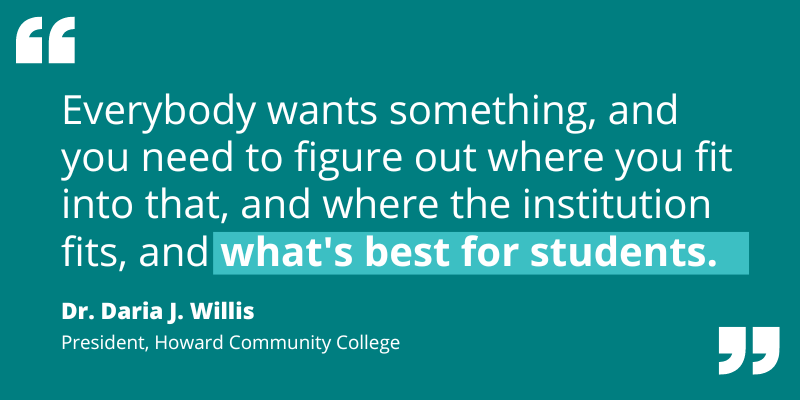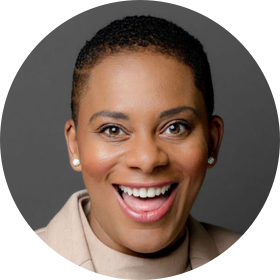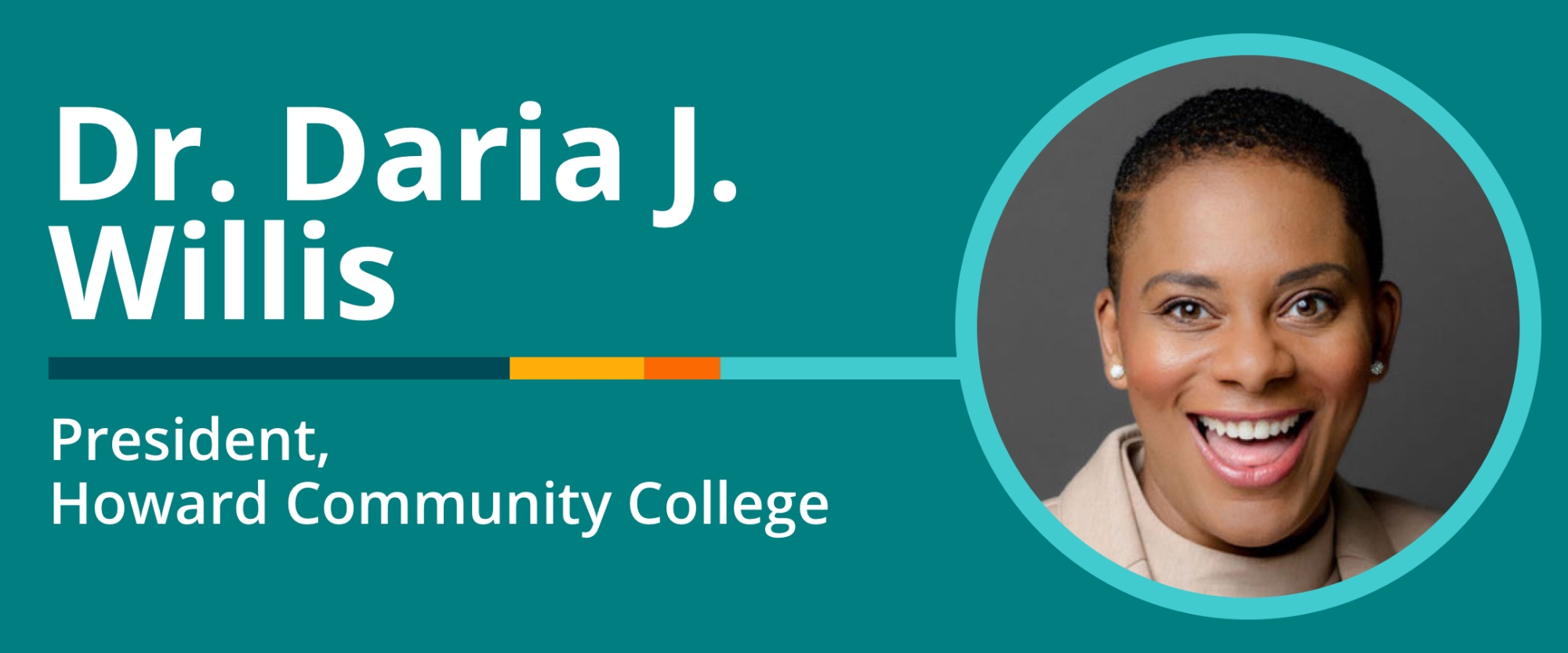The University Innovation Alliance (UIA) is always honored when previous Weekly Wisdom Podcast guests return to share their growth and insights. Dr. Daria J. Willis, former president of Everett Community College, now leads Howard Community College. President Willis shared lessons learned at her previous job, expectations and challenges for presidents of color, ensuring the support of your board, tips for contract negotiations, and a book from grad school that still resonates.
Practical Advice for New Higher Ed Leaders
Howard Community College is President Willis' second top leadership role. She immediately applied a lesson learned in her previous presidency:
"Trust no one when you come in the door. You think that everybody is happy to see you there. They really are not, especially what I call the root guards, folks that have been rooted in the institution for years. The ones who hit you up first with that welcome card or email, be careful of them. In my experience, they are the ones who cycle back three to six months down the road, and there's an issue that you need to take care of because of whatever relationship you started with them in the beginning. Months later, you'll have a much clearer picture of the real story. I've gotten my cuts and bruises from that. Everybody wants something, and you need to figure out where you fit into that, and where the institution fits, and what's best for students."

She offered some advice about finding that fit:
"It's a process of listening. When you start hearing the same themes from groups across the campus and the community, you begin to see, 'Okay, this might be the clearer picture than what I was originally told.' Just be patient. In my first presidency, I moved a little too quickly. This time, I took the foot off the gas, sat back, and did a six-month tour listening to folks. I would keep a journal, and in my fourth or fifth month, I started to read it out loud and replay some of those themes. Then I brought in a trusted colleague to help me look at things in a different way."
Leadership Strategy for Presidents of Color
As the first woman and first person of color to lead an institution, President Willis has noticed extra layers of challenge and expectation. She explained how those factors help her choose her battles:
"Presidents today, especially if you're a president of color, you are evaluated -- this is just my opinion, there's no research behind it -- completely differently than presidents of the past, who were evaluated on how many pretty buildings we can put on a campus. It depends on the situations facing you. If the college is going to be put at risk, that's something that you need to go on the battlefield for. If it's a situation where people on your leadership team are annoying, you can wait on that. At Everett, the challenge was a pandemic on top of everything else. So, I took on much more than I would've anticipated due to issues out of my control. Here, I have been able to strategically say, 'Here are the things that we need to do.' But before I do it, I go back to my board and say, 'What's your temperature on these things?' When your board is behind you, because you've prepped them, people remember these were the hard decisions that needed to be made. But if you don't have that relationship, it makes it harder for presidents of color.
"I'll add that I have made it a point to be active in my community my first year. I've tried to be seen everywhere, take pictures, eat all the chicken dinners, kiss all the babies, go to all the things, so that I can build a community and support system out there while I'm building and fixing in here."
The Politics of Higher Ed Leadership
There may be strategic reasons why businesses or institutions might position a new leader for failure. Sometimes those new leaders are very different from their predecessors. Sadly, we've noticed that higher ed isn't immune from this practice. President Willis noticed it, too, and explained why new leaders should verify the extent of support they're receiving:
"I go back to my board all the time and say, 'Alright, this is what we found. Before we do this, let me remind you, this is what you hired me to do, so y'all got to have my back on this.' And I often think when you get ready to hire the first person of color or the first woman, the question becomes, is the community ready? Is the board ready? Is the college ready? Are you going to hold that president to the same standards that you held their predecessors? Don't continue to move the goalpost further and further back, and then point the finger if they don't meet these standards that you put out there, that you all didn't have a clear understanding of the roles when you came into the position."
Must-Haves and Nice-to-Haves for New Presidents
President Willis also noted that, while it's exciting to be hired as a leader, new presidents should remember their own needs as they negotiate the contract:
"Vacation time is key. My first job, I didn't have enough time to take off for the holiday break. I was sitting in my office the week of Christmas, and I went back to the board and was like, 'Hey.' So think about those things.
"Executive coaching is so important. And you need more than one coach, because colleges have to be much more entrepreneurial than we were in the past. So you need a coach to help you think about the things that you need to be focused on to grow your revenue. You have your CFO and business officers, but you also need a true out-of-the-box thinker to support you."
Some things can't be written into a contract, but President Willis identified one of her top nice-to-haves:
"Many of our trustees are older, much more established, and come from backgrounds that people of color don't. When we come into our positions, I think we need to see more trustees that have lived experiences, so that when it comes to the support that new and different presidents require, you have someone on your board that understands what your lived experience is and can help articulate that to the rest of the trustees."
She added that, regardless of who is on the board, new leaders should be allowed to figure out how they are going to lead:
"You can be a leader one way at an institution in the Pacific Northwest, for example, but when you go to the East Coast, that looks very different, because you're in a completely different community. They're very different conversations that we have here. So the board needs to allow you the space to do that, versus saying to you, 'Here are all the things that you need to do on day one.' So I got to give my board props here at Howard, because for my first year, they agreed, 'We're not going to give you any true goals besides keeping the strategic plan moving. But see the lay of the land. See how you want to do things. Bring us back the issues, and then let's talk through how we're going to hold you accountable to what we've hired you to do at the institution.'"
Learning More About Leadership
We encourage our guests to recommend books that have been their leadership touchstones. President Willis suggested this title:
"This is a book from grad school that I re-read before I got into my first presidency: Shifting: The Double Lives of Black Women in America by Charisse Jones and Kumea Shorter-Gooden. It talks about the intersection between race, class, and gender for Black women, and how they have to live double lives inside the home and outside. It's a thought piece on how you don't have to do that. I have worked really hard because of that book to just be my authentic self. I don't have the energy to be one person at home and somebody else on campus. So, I have learned that what you see is what you get. I know how to act in front of state legislators, but I'm still Dr. Willis and Daria."
She also mentioned a program she joined before starting her current position:
"I was selected as an Aspen Ascend fellow, the 2021 class. That is the most influential experience I've had. It gave us the space to be leaders, to think, where it's quiet and you can practice the Socratic method. You can read, and you can discuss with people in different industries. You're all going for the same goal, to help children and families across the country, but you're doing it in very different ways, and you can take pieces of that back to your institution. I loved that 18-month experience of being able to take a step back from my college, thankful to my board that they supported me in that. So, my advice is find that space where you can think about what you're doing before you do it, where you can reflect, where you can challenge each other and people outside of higher ed to learn and grow, and then bring that back in your leadership journey at the college."
Note: This interview in the Weekly Wisdom Series originally aired on May 1, 2023 as part of the University Innovation Alliance’s Innovating Together Podcast, appearing live on Facebook, Twitter, and LinkedIn.
Links Mentioned in This Episode
• University Innovation Alliance
• Weekly Wisdom Podcast
• Dr. Daria J. Willis
• Everett Community College ("Creating & Sustaining Community During the Pandemic: A Conversation With Daria J. Willis, Everett Community College President" UIA, 2/11/21)
• Howard Community College
• Shifting: The Double Lives of Black Women in America by Charisse Jones and Kumea Shorter-Gooden
• Aspen Ascend (a leadership program at the Aspen Institute)
Bios of Guest and Co-Hosts

Guest: Daria J. Willis, President, Howard Community College
Dr. Daria J. Willis, the fifth president of Howard Community College (Columbia, Maryland), is the first Black woman appointed to that office. Previously, she served as President of Everett Community College (Everett, Washington), and Provost and Senior Vice President of Academic Affairs at Onondaga Community College (Syracuse, New York), where she implemented programs targeted at increasing enrollment and providing access and equity to underserved and underrepresented populations, as well as overseeing curriculum development and streamlining faculty hires. Dr. Willis began her educational career in 2007 teaching at Florida A&M University before transitioning to Tallahassee Community College. Starting in 2010, Dr. Willis served as an Assistant Professor of History, department chair, faculty senate president, and Executive Dean of Centers at Lone Star College (Houston, Texas). She also implemented Lone Star's first Doctoral Support Group for faculty and staff. She later served as Dean of Academic Studies at Lee College (Baytown, Texas), a Hispanic-Serving Institution, where she started its first National Model United Nations program. Dr. Willis is a 2018 recipient of the American Association for Women in Community Colleges’ “40 Under 40” Award. She is a 2017 Cohort Fellow for the Thomas Lakin Institute for Mentored Leadership and was featured in the December 2017 issue of Diverse: Issues in Higher Education. She earned a Ph.D. in history from Florida State University, and bachelor's and master's degrees in history from Florida A&M University. Dr. Willis is married to Dr. Isiah Brown, and they have three children.

Co-Host: Bridget Burns, Executive Director, University Innovation Alliance
Dr. Bridget Burns is the founding Executive Director of the University Innovation Alliance (UIA). For the past decade, she has advised university presidents, system chancellors, and state and federal policy leaders on strategies to expand access to higher education, address costs, and promote completion for students of all backgrounds. The UIA was developed during Bridget’s tenure as an American Council on Education (ACE) Fellowship at Arizona State University. She held multiple roles within the Oregon University System, including serving as Chief of Staff and Senior Policy Advisor, where she won the national award for innovation in higher education government relations. She was a National Associate for the National Center for Public Policy and Higher Education, and has served on several statewide governing boards including ones governing higher education institutions, financial aid policy, and policy areas impacting children and families.

Co-Host: Doug Lederman, Editor and Co-Founder, Inside Higher Ed
Doug Lederman is editor and co-founder of Inside Higher Ed. With Scott Jaschik, he leads the site's editorial operations, overseeing news content, opinion pieces, career advice, blogs and other features. Doug speaks widely about higher education, including on C-Span and National Public Radio and at meetings and on campuses around the country. His work has appeared in The New York Times and USA Today, among other publications. Doug was managing editor of The Chronicle of Higher Education from 1999 to 2003, after working at The Chronicle since 1986 in a variety of roles. He has won three National Awards for Education Reporting from the Education Writers Association, including one for a 2009 series of Inside Higher Ed articles on college rankings. He began his career as a news clerk at The New York Times. He grew up in Shaker Heights, Ohio, and graduated in 1984 from Princeton University. Doug and his wife, Kate Scharff, live in Bethesda, MD.
About Weekly Wisdom
Weekly Wisdom is an event series that happens live on Facebook, Twitter, and LinkedIn. It also becomes a podcast episode. Every week, we join forces with Inside Higher Ed and talk with a sitting college president or chancellor about how they're specifically navigating the challenges of this moment. These conversations will be filled with practicable things you can do right now by unpacking how and why college leaders are making decisions within higher education. Hopefully, these episodes will also leave you with a sense of optimism and a bit of inspiration.
Rate, Review & Subscribe
Learn why hundreds of people have rated this new podcast 5 stars! Please join others and rate and review this podcast. This helps us reach and inform more people -- like you -- to help increase the number and diversity of college graduates in the United States.
Click here, scroll to the bottom, tap to rate with five stars, and select “Write a Review.” Then be sure to let us know what you loved most about the episode! Also, if you haven’t done so already, subscribe to the podcast. We’ll be adding a bunch of bonus episodes to the feed and, if you’re not subscribed, there’s a good chance you’ll miss out.

